Analyzing Decision-Making Strategies for Hospitality Managers
VerifiedAdded on 2023/06/03
|5
|1474
|203
Report
AI Summary
This report examines the diverse approaches to decision-making in the hospitality industry, contrasting rational and intuitive methods. It details the eight-step decision-making process, emphasizing the significance of managerial decisions in planning, organizing, leading, and controlling. The report highlights the key differences between rational and intuitive approaches, discussing their respective strengths and limitations, such as the thoroughness of rational methods versus the speed of intuitive judgments. It addresses the influence of factors like values, emotions, and experiences on managerial decisions. The report concludes that a combined approach, integrating both intuitive and rational elements, is most suitable for effective hospitality management, acknowledging the importance of knowing when to apply each approach for optimal results. The report references several academic sources to support its analysis, including works by Mintz (2016), Calabretta et al. (2017), and others.
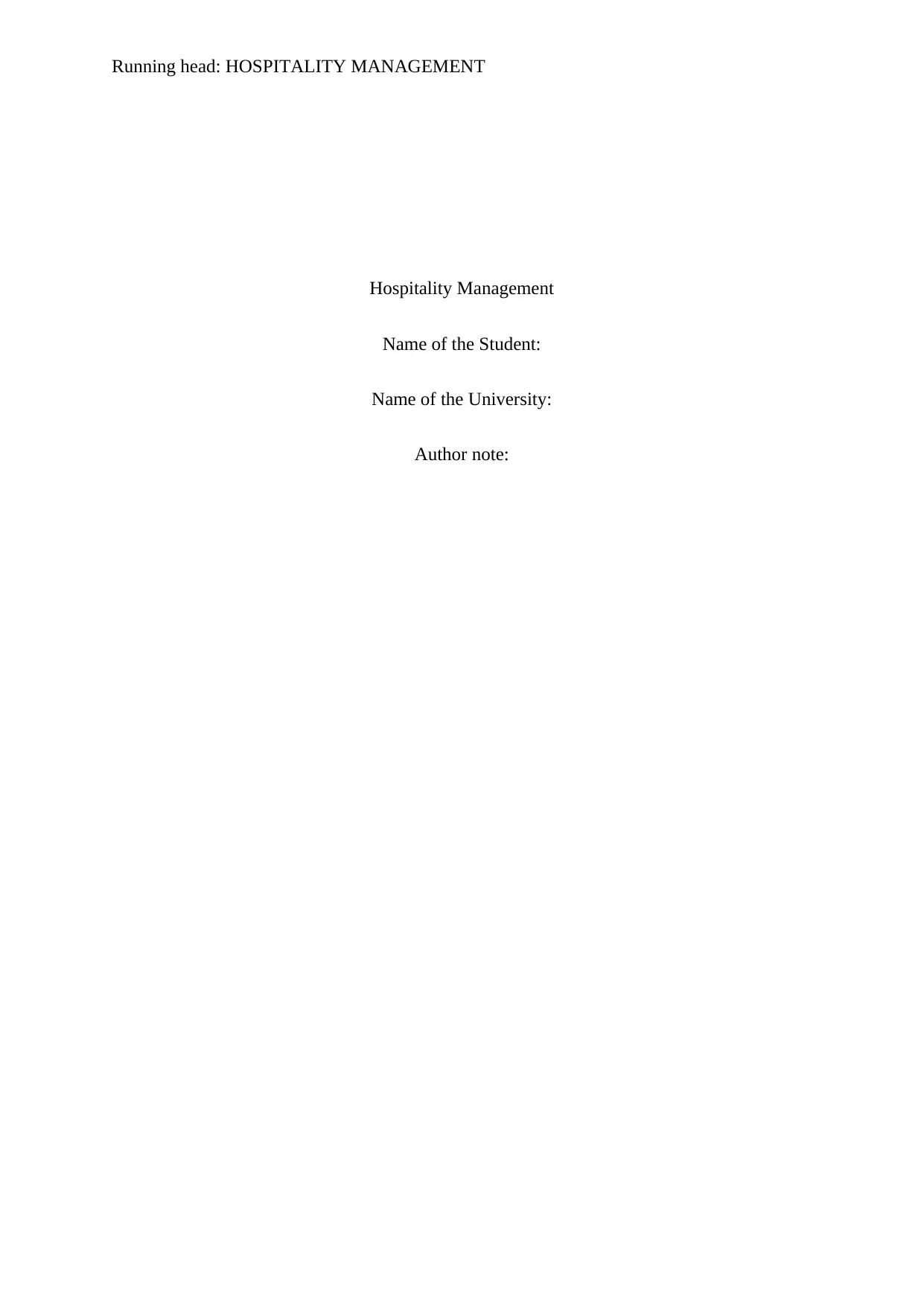
Running head: HOSPITALITY MANAGEMENT
Hospitality Management
Name of the Student:
Name of the University:
Author note:
Hospitality Management
Name of the Student:
Name of the University:
Author note:
Paraphrase This Document
Need a fresh take? Get an instant paraphrase of this document with our AI Paraphraser
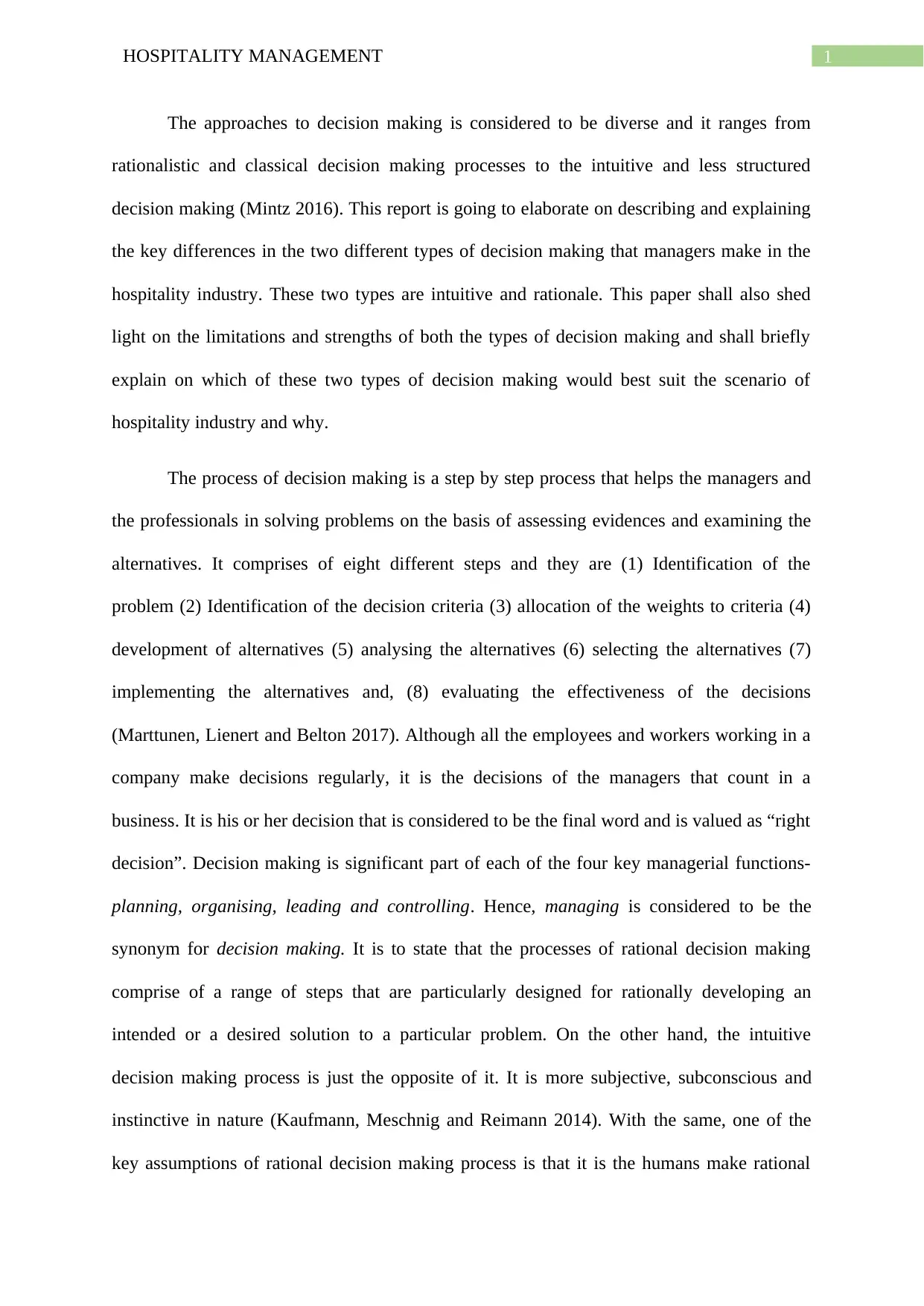
1HOSPITALITY MANAGEMENT
The approaches to decision making is considered to be diverse and it ranges from
rationalistic and classical decision making processes to the intuitive and less structured
decision making (Mintz 2016). This report is going to elaborate on describing and explaining
the key differences in the two different types of decision making that managers make in the
hospitality industry. These two types are intuitive and rationale. This paper shall also shed
light on the limitations and strengths of both the types of decision making and shall briefly
explain on which of these two types of decision making would best suit the scenario of
hospitality industry and why.
The process of decision making is a step by step process that helps the managers and
the professionals in solving problems on the basis of assessing evidences and examining the
alternatives. It comprises of eight different steps and they are (1) Identification of the
problem (2) Identification of the decision criteria (3) allocation of the weights to criteria (4)
development of alternatives (5) analysing the alternatives (6) selecting the alternatives (7)
implementing the alternatives and, (8) evaluating the effectiveness of the decisions
(Marttunen, Lienert and Belton 2017). Although all the employees and workers working in a
company make decisions regularly, it is the decisions of the managers that count in a
business. It is his or her decision that is considered to be the final word and is valued as “right
decision”. Decision making is significant part of each of the four key managerial functions-
planning, organising, leading and controlling. Hence, managing is considered to be the
synonym for decision making. It is to state that the processes of rational decision making
comprise of a range of steps that are particularly designed for rationally developing an
intended or a desired solution to a particular problem. On the other hand, the intuitive
decision making process is just the opposite of it. It is more subjective, subconscious and
instinctive in nature (Kaufmann, Meschnig and Reimann 2014). With the same, one of the
key assumptions of rational decision making process is that it is the humans make rational
The approaches to decision making is considered to be diverse and it ranges from
rationalistic and classical decision making processes to the intuitive and less structured
decision making (Mintz 2016). This report is going to elaborate on describing and explaining
the key differences in the two different types of decision making that managers make in the
hospitality industry. These two types are intuitive and rationale. This paper shall also shed
light on the limitations and strengths of both the types of decision making and shall briefly
explain on which of these two types of decision making would best suit the scenario of
hospitality industry and why.
The process of decision making is a step by step process that helps the managers and
the professionals in solving problems on the basis of assessing evidences and examining the
alternatives. It comprises of eight different steps and they are (1) Identification of the
problem (2) Identification of the decision criteria (3) allocation of the weights to criteria (4)
development of alternatives (5) analysing the alternatives (6) selecting the alternatives (7)
implementing the alternatives and, (8) evaluating the effectiveness of the decisions
(Marttunen, Lienert and Belton 2017). Although all the employees and workers working in a
company make decisions regularly, it is the decisions of the managers that count in a
business. It is his or her decision that is considered to be the final word and is valued as “right
decision”. Decision making is significant part of each of the four key managerial functions-
planning, organising, leading and controlling. Hence, managing is considered to be the
synonym for decision making. It is to state that the processes of rational decision making
comprise of a range of steps that are particularly designed for rationally developing an
intended or a desired solution to a particular problem. On the other hand, the intuitive
decision making process is just the opposite of it. It is more subjective, subconscious and
instinctive in nature (Kaufmann, Meschnig and Reimann 2014). With the same, one of the
key assumptions of rational decision making process is that it is the humans make rational
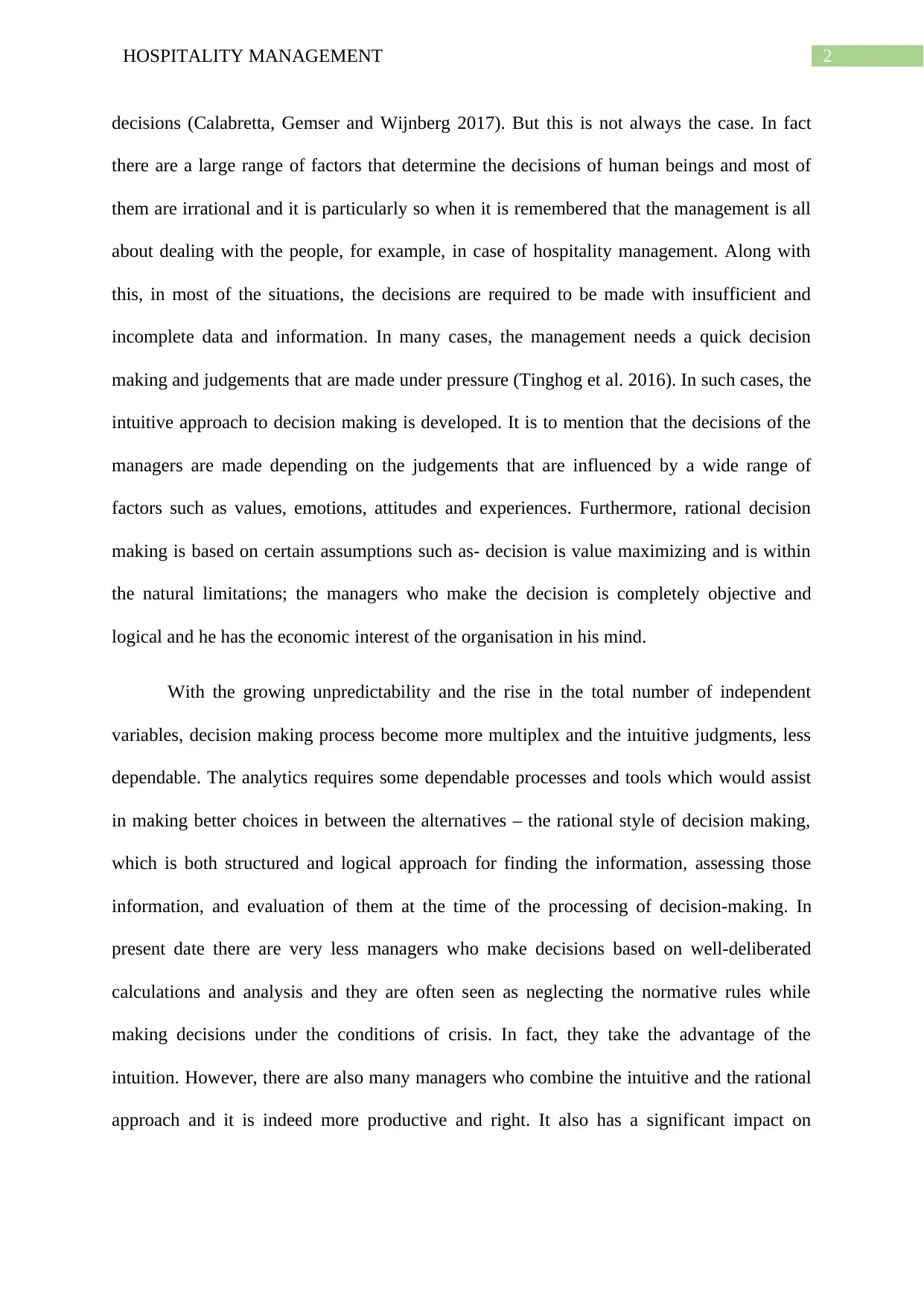
2HOSPITALITY MANAGEMENT
decisions (Calabretta, Gemser and Wijnberg 2017). But this is not always the case. In fact
there are a large range of factors that determine the decisions of human beings and most of
them are irrational and it is particularly so when it is remembered that the management is all
about dealing with the people, for example, in case of hospitality management. Along with
this, in most of the situations, the decisions are required to be made with insufficient and
incomplete data and information. In many cases, the management needs a quick decision
making and judgements that are made under pressure (Tinghog et al. 2016). In such cases, the
intuitive approach to decision making is developed. It is to mention that the decisions of the
managers are made depending on the judgements that are influenced by a wide range of
factors such as values, emotions, attitudes and experiences. Furthermore, rational decision
making is based on certain assumptions such as- decision is value maximizing and is within
the natural limitations; the managers who make the decision is completely objective and
logical and he has the economic interest of the organisation in his mind.
With the growing unpredictability and the rise in the total number of independent
variables, decision making process become more multiplex and the intuitive judgments, less
dependable. The analytics requires some dependable processes and tools which would assist
in making better choices in between the alternatives – the rational style of decision making,
which is both structured and logical approach for finding the information, assessing those
information, and evaluation of them at the time of the processing of decision-making. In
present date there are very less managers who make decisions based on well-deliberated
calculations and analysis and they are often seen as neglecting the normative rules while
making decisions under the conditions of crisis. In fact, they take the advantage of the
intuition. However, there are also many managers who combine the intuitive and the rational
approach and it is indeed more productive and right. It also has a significant impact on
decisions (Calabretta, Gemser and Wijnberg 2017). But this is not always the case. In fact
there are a large range of factors that determine the decisions of human beings and most of
them are irrational and it is particularly so when it is remembered that the management is all
about dealing with the people, for example, in case of hospitality management. Along with
this, in most of the situations, the decisions are required to be made with insufficient and
incomplete data and information. In many cases, the management needs a quick decision
making and judgements that are made under pressure (Tinghog et al. 2016). In such cases, the
intuitive approach to decision making is developed. It is to mention that the decisions of the
managers are made depending on the judgements that are influenced by a wide range of
factors such as values, emotions, attitudes and experiences. Furthermore, rational decision
making is based on certain assumptions such as- decision is value maximizing and is within
the natural limitations; the managers who make the decision is completely objective and
logical and he has the economic interest of the organisation in his mind.
With the growing unpredictability and the rise in the total number of independent
variables, decision making process become more multiplex and the intuitive judgments, less
dependable. The analytics requires some dependable processes and tools which would assist
in making better choices in between the alternatives – the rational style of decision making,
which is both structured and logical approach for finding the information, assessing those
information, and evaluation of them at the time of the processing of decision-making. In
present date there are very less managers who make decisions based on well-deliberated
calculations and analysis and they are often seen as neglecting the normative rules while
making decisions under the conditions of crisis. In fact, they take the advantage of the
intuition. However, there are also many managers who combine the intuitive and the rational
approach and it is indeed more productive and right. It also has a significant impact on
⊘ This is a preview!⊘
Do you want full access?
Subscribe today to unlock all pages.

Trusted by 1+ million students worldwide
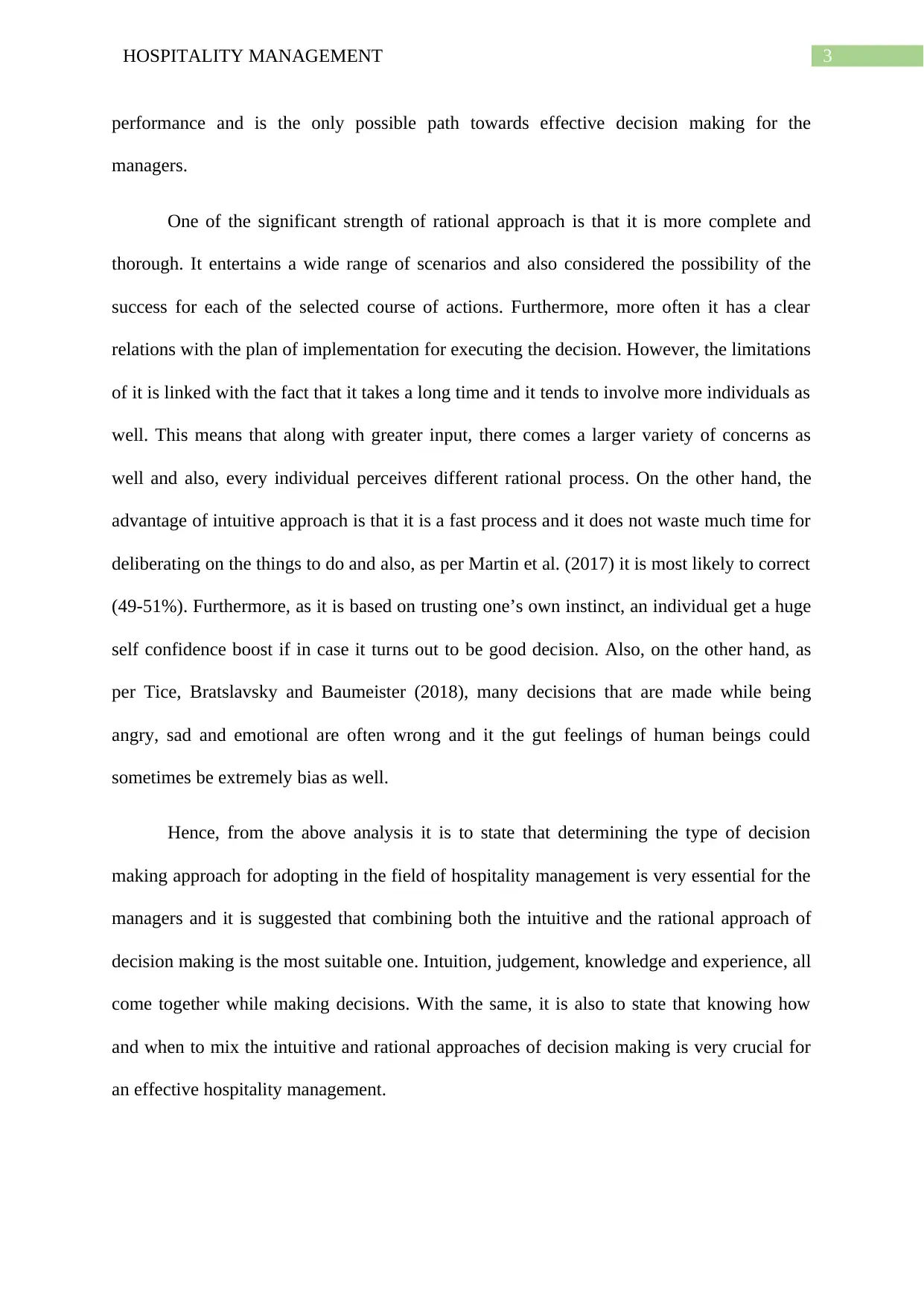
3HOSPITALITY MANAGEMENT
performance and is the only possible path towards effective decision making for the
managers.
One of the significant strength of rational approach is that it is more complete and
thorough. It entertains a wide range of scenarios and also considered the possibility of the
success for each of the selected course of actions. Furthermore, more often it has a clear
relations with the plan of implementation for executing the decision. However, the limitations
of it is linked with the fact that it takes a long time and it tends to involve more individuals as
well. This means that along with greater input, there comes a larger variety of concerns as
well and also, every individual perceives different rational process. On the other hand, the
advantage of intuitive approach is that it is a fast process and it does not waste much time for
deliberating on the things to do and also, as per Martin et al. (2017) it is most likely to correct
(49-51%). Furthermore, as it is based on trusting one’s own instinct, an individual get a huge
self confidence boost if in case it turns out to be good decision. Also, on the other hand, as
per Tice, Bratslavsky and Baumeister (2018), many decisions that are made while being
angry, sad and emotional are often wrong and it the gut feelings of human beings could
sometimes be extremely bias as well.
Hence, from the above analysis it is to state that determining the type of decision
making approach for adopting in the field of hospitality management is very essential for the
managers and it is suggested that combining both the intuitive and the rational approach of
decision making is the most suitable one. Intuition, judgement, knowledge and experience, all
come together while making decisions. With the same, it is also to state that knowing how
and when to mix the intuitive and rational approaches of decision making is very crucial for
an effective hospitality management.
performance and is the only possible path towards effective decision making for the
managers.
One of the significant strength of rational approach is that it is more complete and
thorough. It entertains a wide range of scenarios and also considered the possibility of the
success for each of the selected course of actions. Furthermore, more often it has a clear
relations with the plan of implementation for executing the decision. However, the limitations
of it is linked with the fact that it takes a long time and it tends to involve more individuals as
well. This means that along with greater input, there comes a larger variety of concerns as
well and also, every individual perceives different rational process. On the other hand, the
advantage of intuitive approach is that it is a fast process and it does not waste much time for
deliberating on the things to do and also, as per Martin et al. (2017) it is most likely to correct
(49-51%). Furthermore, as it is based on trusting one’s own instinct, an individual get a huge
self confidence boost if in case it turns out to be good decision. Also, on the other hand, as
per Tice, Bratslavsky and Baumeister (2018), many decisions that are made while being
angry, sad and emotional are often wrong and it the gut feelings of human beings could
sometimes be extremely bias as well.
Hence, from the above analysis it is to state that determining the type of decision
making approach for adopting in the field of hospitality management is very essential for the
managers and it is suggested that combining both the intuitive and the rational approach of
decision making is the most suitable one. Intuition, judgement, knowledge and experience, all
come together while making decisions. With the same, it is also to state that knowing how
and when to mix the intuitive and rational approaches of decision making is very crucial for
an effective hospitality management.
Paraphrase This Document
Need a fresh take? Get an instant paraphrase of this document with our AI Paraphraser
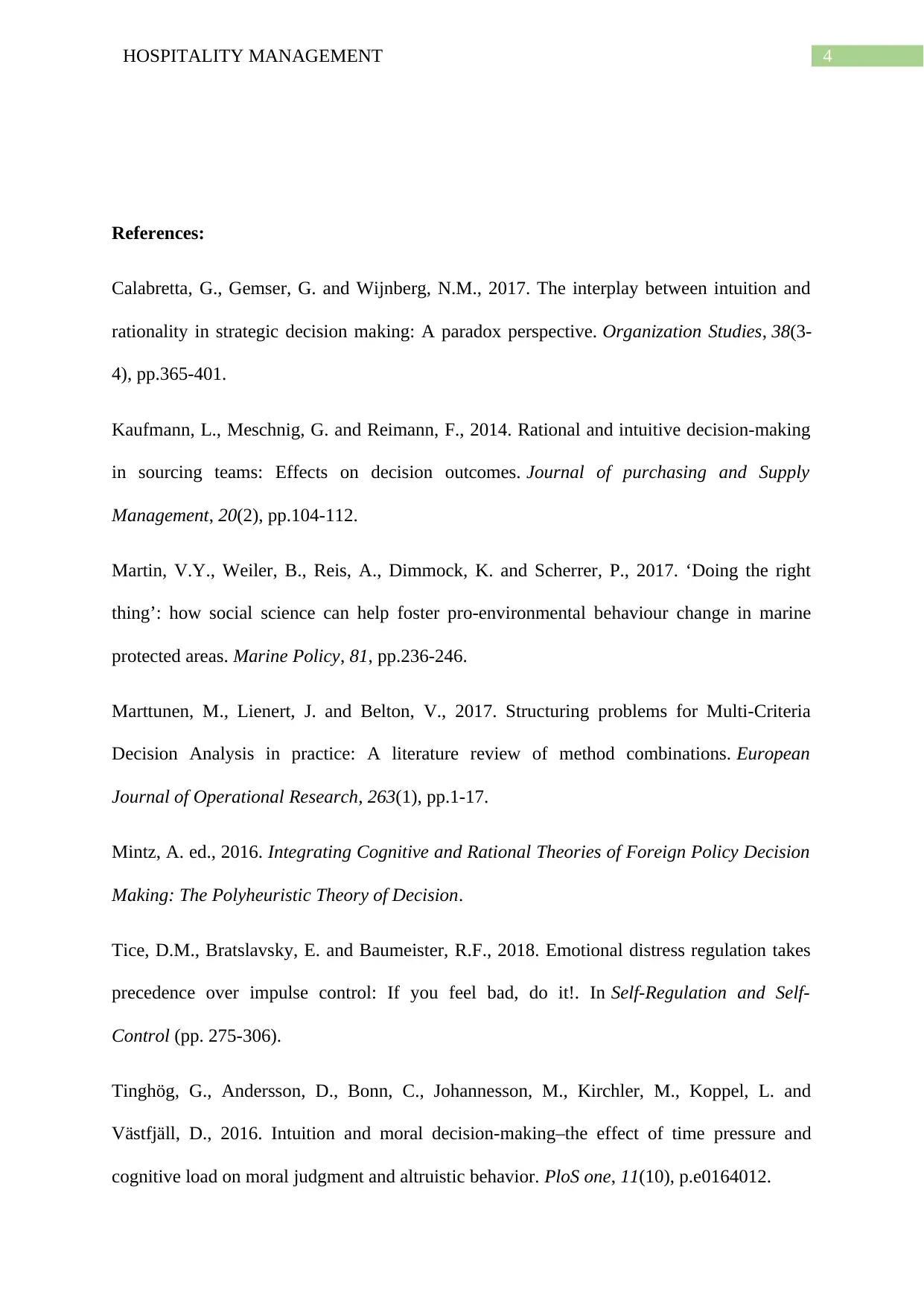
4HOSPITALITY MANAGEMENT
References:
Calabretta, G., Gemser, G. and Wijnberg, N.M., 2017. The interplay between intuition and
rationality in strategic decision making: A paradox perspective. Organization Studies, 38(3-
4), pp.365-401.
Kaufmann, L., Meschnig, G. and Reimann, F., 2014. Rational and intuitive decision-making
in sourcing teams: Effects on decision outcomes. Journal of purchasing and Supply
Management, 20(2), pp.104-112.
Martin, V.Y., Weiler, B., Reis, A., Dimmock, K. and Scherrer, P., 2017. ‘Doing the right
thing’: how social science can help foster pro-environmental behaviour change in marine
protected areas. Marine Policy, 81, pp.236-246.
Marttunen, M., Lienert, J. and Belton, V., 2017. Structuring problems for Multi-Criteria
Decision Analysis in practice: A literature review of method combinations. European
Journal of Operational Research, 263(1), pp.1-17.
Mintz, A. ed., 2016. Integrating Cognitive and Rational Theories of Foreign Policy Decision
Making: The Polyheuristic Theory of Decision.
Tice, D.M., Bratslavsky, E. and Baumeister, R.F., 2018. Emotional distress regulation takes
precedence over impulse control: If you feel bad, do it!. In Self-Regulation and Self-
Control (pp. 275-306).
Tinghög, G., Andersson, D., Bonn, C., Johannesson, M., Kirchler, M., Koppel, L. and
Västfjäll, D., 2016. Intuition and moral decision-making–the effect of time pressure and
cognitive load on moral judgment and altruistic behavior. PloS one, 11(10), p.e0164012.
References:
Calabretta, G., Gemser, G. and Wijnberg, N.M., 2017. The interplay between intuition and
rationality in strategic decision making: A paradox perspective. Organization Studies, 38(3-
4), pp.365-401.
Kaufmann, L., Meschnig, G. and Reimann, F., 2014. Rational and intuitive decision-making
in sourcing teams: Effects on decision outcomes. Journal of purchasing and Supply
Management, 20(2), pp.104-112.
Martin, V.Y., Weiler, B., Reis, A., Dimmock, K. and Scherrer, P., 2017. ‘Doing the right
thing’: how social science can help foster pro-environmental behaviour change in marine
protected areas. Marine Policy, 81, pp.236-246.
Marttunen, M., Lienert, J. and Belton, V., 2017. Structuring problems for Multi-Criteria
Decision Analysis in practice: A literature review of method combinations. European
Journal of Operational Research, 263(1), pp.1-17.
Mintz, A. ed., 2016. Integrating Cognitive and Rational Theories of Foreign Policy Decision
Making: The Polyheuristic Theory of Decision.
Tice, D.M., Bratslavsky, E. and Baumeister, R.F., 2018. Emotional distress regulation takes
precedence over impulse control: If you feel bad, do it!. In Self-Regulation and Self-
Control (pp. 275-306).
Tinghög, G., Andersson, D., Bonn, C., Johannesson, M., Kirchler, M., Koppel, L. and
Västfjäll, D., 2016. Intuition and moral decision-making–the effect of time pressure and
cognitive load on moral judgment and altruistic behavior. PloS one, 11(10), p.e0164012.
1 out of 5
Related Documents
Your All-in-One AI-Powered Toolkit for Academic Success.
+13062052269
info@desklib.com
Available 24*7 on WhatsApp / Email
![[object Object]](/_next/static/media/star-bottom.7253800d.svg)
Unlock your academic potential
Copyright © 2020–2025 A2Z Services. All Rights Reserved. Developed and managed by ZUCOL.





